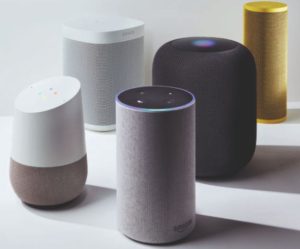Introduction
About ten million people in the UK now use a smart speaker, and they’re gaining popularity across the world. These convenient devices listen to our every command. But when does ‘listening’ become ‘spying’? We discuss smart speakers.
前書き
スマートスピーカーは英国で今や約1000万の人に使われ、世界中で大人気です。この便利な装置はあらゆる命令に耳を傾けます。しかし、「聴く」ことがいつ「スパイ」に変わるでしょうか。スマートスピーカーについて説明します。

Conversation
A: One quick question for you… do you have a smart speaker? You know, like the Google Assistant, Amazon’s Alexa or Apple’s Siri.
B: Oh sure, yes, I’ve got one! It’s great! I can ask it all sorts of questions, it tells me about the news and weather, it plays music when I want… it does all sorts! You just give it a voice command and it does what you want!
会話
A:ちょっと訊くけどスマートスピーカーを持ってる? 例えば、Googleアシスタント、AmazonのAlexa、またはAppleのSiriなんか。
B:もちろん持ってるよ! 優れものだよ! どんな質問だってできるんだ。ニュースや天気、それに好きな音楽をかけてくれる。音で命令するだけで自由自在さ!
A: So it can hear you, can it?
B: Of course! How else can you give it a voice command?
A: All the time?
B: Well, I assume so.
A: So how do you know it’s not eavesdropping on you?
B: Well, I… oh… I see. I hadn’t thought of that.
A:それって言うことを聞いてるんだよね?
B:もちろん! 他にどうやって音で命令できるってんだい?
A:ずっと?
B:そうだよ。
A:じゃあ、会話を傍受されていないってどうやって言えるの?
B:ええと、ああ…なるほど。考えてなかった。
Florian Schaub is an assistant professor at the University of Michigan School of Information. Here he is speaking on the BBC World Service programme The Why Factor about smart speakers. What does he say people are introducing into their homes?
フロリアン・シャウブはミシガン大学情報学部の助教授です。スマートスピーカーについてのBBCワールドサービスプログラム『The Why Factor』で語っています。人々が家庭にスマートスピーカーを備えることについてなんと言っているでしょう。
 Florian Schaub
Florian Schaub
You’re basically introducing… listening bug in your home, in your most intimate space. While the companies say they are only actively listening to what’s going on in your home when they hear the keyword, the microphone is still on the whole time in order to be able to detect that keyword. We don’t know to what extent companies are co-operating with the government or to what extent the government might try to circumvent company security mechanisms in order to then be able to listen to what you’re doing.
フロリアン・シャウブ
基本的に、家の中、つまり最も親密な空間に聴く機器を導入しているんです。メーカーは、機器がキーワードを聞いたときに家の中で何が起こっているかを逃さないように聴いているだけだと言っていますが、キーワードを検知できるようにマイクがずっとオンになっているのです。企業が政府とどの程度協力し、またはどの程度政府が企業のセキュリティ・メカニズムを回避し、それによって人の行動をチェックしようとしているのか、我々の関知しないところです。
He suggested that we can’t know how far a company might be co-operating with a government to eavesdrop on people. Or whether a government might be circumventing a smart speaker’s security and listening in anyway without the company’s or owner’s permission!
フロリアンは、企業が人々の声を傍受するために政府とどの程度協力しているのかわからないと示唆しました。あるいは政府がスマートスピーカーのセキュリティを迂回して、企業や所有者の許可なしに傍受している可能性があります。
So if all this eavesdropping is possible, why are smart speakers so popular?
それでは、このような盗聴がすべて可能であるにも関わらず、スマートスピーカーはなぜそれほど人気があるのでしょうか。
Here’s Florian Schaub again with an answer. He conducted a study on people’s attitudes to privacy when it comes to smart speakers. How do people feel about having a smart speaker that could eavesdrop on them?
ここでまたフロリアン・シャウブが答えます。彼はスマートスピーカーに関して、プライバシーに対する人々の対応ぶりを調査しました。 盗聴される可能性のあるスマートスピーカーを持っていることについて人々はどのように感じているのでしょう。
Florian Schaub
What we often saw is people just being resigned to ‘this is the trade–off they have to make’ if they want to enjoy the convenience that a smart speaker provides to them.
フロリアン・シャウブ
よく見かけるのは、人々がスマートスピーカーの利便性を享受したい以上、「妥協も甘んじて受けざるを得ない」としていることです。



Pingback: 盲点の英単語(その83)「盗聴する」という難しい単語を覚える | 中学の英語をあなどってはいけない